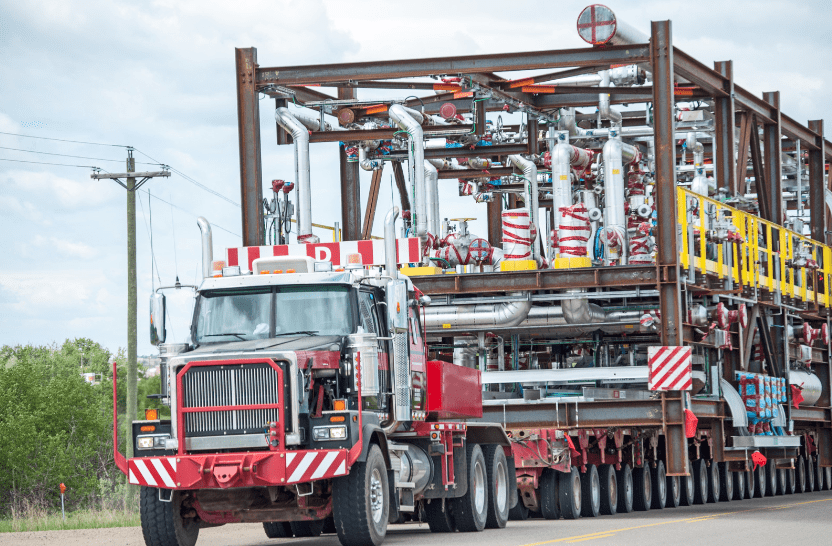Trucking, a vital industry, provides diverse job opportunities, but pay scales vary. We explore factors influencing trucker pay, emphasizing experience, specialized training, and certifications. Specializations like oversize load and hazmat hauling often command higher compensation. Choosing the right company, negotiating rates as an owner-operator, and considering route preferences impact earnings.
Certifications such as Tanker or Double/Triple Trailer endorsements enhance earning potential. The rise of autonomous vehicles introduces new, well-paying opportunities for those skilled in overseeing these systems. Truckers can maximize earnings by doing trucker jobs that consider factors like technology adoption, negotiation skills, bonuses, and industry trends.
This overview serves as a guide for truckers navigating the complexities of compensation within the industry. Subsequent articles in this series will delve deeper into each factor, providing comprehensive insights for those aiming to thrive in the trucking profession.
Factors Influencing Trucker Jobs’ Pay

Embarking on a career as a truck driver opens up a realm of possibilities, but what determines the financial journey on the open road? Let’s break down the key factors that influence truck driver compensation, unveiling the nuances that steer their earning potential.
1. Experience
- Seasoned drivers command higher pay.
- Experience brings invaluable industry insights and problem-solving skills.
2. Industry Demand
- Economic conditions and consumer spending dictate demand.
- High demand triggers competitive wages to attract skilled drivers.
3. Type of Trucking Job
- Long-haul or OTR jobs offer higher pay.
- Extended time away from home demands dedication and is rewarded accordingly.
4. Geographic Location
- Wage disparities exist across regions.
- Urban hubs and busy transportation corridors offer heightened compensation.
5. Level of Specialization
- Specialized skills, like hazmat endorsement, command higher pay.
- Advanced certifications for handling heavy machinery elevate earning potential.
Truck driver pay is a multifaceted journey influenced by experience, economic shifts, job type, location, and specialization. As drivers gear up for their careers, understanding these factors becomes the compass guiding them towards informed decisions and financial success on the asphalt. The road ahead is not just a physical journey but a financial one, where each turn brings new opportunities for growth and prosperity.
High-Paying Specializations in Trucking

Let’s explore some high-paying trucker jobs that not only command attention but also come with a premium paycheck. Here are trucker jobs that might fit your preference!
1. Hazmat Transport

- What it Involves:
- Transporting hazardous materials like chemicals, gases, or flammable liquids.
- Obtaining a Hazmat endorsement on your CDL and adhering to stringent safety regulations.
- Why it Pays:
- Increased risk demands additional training and safety precautions.
- Companies value experienced Hazmat drivers with impeccable safety records, leading to higher compensation.
2. Oversize Load Hauling

- What it Involves:
- Transporting heavy or oversized cargo that exceeds standard weight or dimension limits.
- Requiring excellent spatial awareness and maneuvering skills while adhering to legal regulations.
- Why it Pays:
- Specialized knowledge and equipment for transporting unique, heavy loads.
- Truckers in this field often command higher pay rates due to the specific skills demanded.
3. Refrigerated Freight

- What it Involves:
- Transporting perishable goods using temperature-controlled trailers (reefers).
- Maintaining precise temperature control and meeting stringent delivery deadlines.
- Why it Pays:
- Added responsibility of preserving product integrity.
- Higher compensations compared to handling general dry van shipments.
4. Tanker Hauling

- What it Involves:
- Transporting liquid-based commodities like oil, gas, chemicals, or even milk and water.
- Managing factors like weight distribution and handling liquid surges during transit.
- Why it Pays:
- Essential role in critical industries with increased risks.
- Specialized skills and strict safety protocols lead to higher incomes.
Specializations within the trucking industry open doors to elevated earning potential, offering a blend of challenges and rewards. Whether you’re navigating hazardous materials, moving oversized loads, keeping things cool in refrigerated freight, or hauling liquid gold, each specialization demands additional training, certifications, and expertise. In a world where precision and professionalism matter, these specialized roles not only carve a unique path but also position you as a valuable asset in the ever-evolving landscape of trucking.
Top-Paying Trucking Companies

Let’s explore some of the leading trucking companies renowned for not only their competitive compensation but also their commitment to driver satisfaction and growth.
1. Schneider National
- Key Features:
- Various routes and positions catering to diverse preferences and expertise.
- Commitment to driver safety with well-maintained equipment.
- Consistent pay increases and bonuses based on performance metrics.
2. J.B. Hunt Transport Services Inc.
- Distinctive Traits:
- Extensive network providing diverse opportunities.
- Lucrative contracts spanning different regions and specialties.
- Collaborative approach with drivers to improve working conditions.
3. Knight-Swift Transportation Holdings Inc.
- Standout Attributes:
- Formed by the merger of Knight Transportation and Swift Transportation.
- Excellent compensation packages with competitive mileage rates.
- Various bonus programs rewarding safe driving practices and fuel efficiency.
4. Pam Transport
- Noteworthy Features:
- Focus on empowering drivers through extensive training programs.
- Supportive resources to enhance skills and earnings potential.
- Lease purchase programs for drivers to become owner-operators.
5. XPO Logistics
- Major Player Highlights:
- Vast array of services including truckload, LTL, and intermodal transportation.
- Diverse options for drivers to maximize earnings.
- Comprehensive benefits package with health insurance, retirement plans, and paid time off.
Considerations for Aspiring Truckers: Beyond Pay Scales
- Individual Factors:
- Earnings potential may vary based on experience, driving record, and route preferences.
- Research and compare companies to find the right fit for individual needs.
- Ultimate Earning Potential:
- Influenced by factors such as experience level and type of routes undertaken.
- Aspiring truckers should align their skills and preferences with the company that suits their career goals.
Choosing the right trucker job for you is not simple; it’s about securing a pathway to a fulfilling and financially rewarding career. While these companies are celebrated for their competitive compensation, the key lies in aligning individual needs and career goals with the right employer. By navigating the roads of research and comparison, aspiring truckers can ensure they are on the path to earning a lucrative income within the dynamic landscape of the trucking industry.
Owner-Operator Opportunities

This arrangement allows individuals to own and operate their own trucks, giving them greater control over their earnings and work schedules. By investing in their equipment, owner-operators have the potential to significantly increase their income compared to traditional company drivers.
One significant advantage of being an owner-operator is the ability to negotiate higher rates. As independent contractors, owner-operators have more leverage when it comes to setting prices for their services.
They can establish direct relationships with shippers and brokers, cutting out the middleman and ultimately earning a larger share of each job they undertake. This autonomy gives them the freedom to assess market demand, identify high-paying routes or industries, and adjust their rates accordingly.
Another benefit of becoming an owner-operator is the possibility of reducing expenses by eliminating certain costs typically borne by company drivers. Owning your truck means you won’t have to pay leasing fees or rental charges on equipment provided by employers.
Additionally, you can take advantage of tax deductions for business-related expenses such as fuel, maintenance, insurance premiums, licenses, permits, and even meals on the road. However, before venturing into owner-operator territory, it is essential for drivers to carefully analyze financial aspects such as upfront costs and ongoing operational expenses.
Purchasing a truck can be a substantial investment that requires proper financing or liquid capital. Moreover, maintenance costs should be factored into the equation since repairs and unexpected breakdowns can dent profits if not properly managed.
To succeed as an owner-operator also requires meticulous planning and effective time management skills. The responsibility of managing one’s business necessitates handling administrative tasks like bookkeeping, dispatching loads efficiently through load boards or personal connections within the industry network while ensuring compliance with all applicable regulations related to transportation operations.
Additionally, establishing solid relationships with reliable brokers or shippers is crucial to secure consistent and high-paying freight. Building a positive reputation within the industry, delivering goods on time, and providing exceptional service are key factors that contribute to maintaining and expanding clientele.
Overall, owner-operator opportunities present a path to financial independence and increased earning potential for experienced truckers willing to embrace the challenges of entrepreneurship in the trucking industry. However, it is essential for drivers to carefully weigh their options, assess their financial capabilities, and plan their operations diligently in order to maximize profits while minimizing risks.
Regional vs. Long-Haul Routes

In the abundance of trucker jobs, the choice between regional and long-haul routes is a pivotal decision that can significantly impact both pay and overall satisfaction. Let’s take a closer look at the pros and cons of each, helping you find the perfect balance between earning potential and the lifestyle you desire.
Regional Routes
- The Scene:
- Shorter distances, focusing on a specific geographic area or state.
- Tailored for those who cherish regular proximity to home.
- Perks:
- Predictable schedules and the luxury of regular home time.
- More manageable travel distances for a healthier work-life equilibrium.
Long-Haul Routes
- The Adventure:
- Extensive journeys crossing state lines and spanning the entire country.
- Offers the thrill of exploration but demands extended periods away from home.
- Rewards:
- Higher pay scales with increased mileage rates and per diem allowances.
- Competitive bonuses based on consistent deliveries and distance covered.
Balancing the Ledger
- Long-Haul Perks:
- Lucrative paychecks with the allure of higher mileage rates.
- Competitive bonuses adding extra padding to your wallet.
- Regional Advantages:
- Attractive pay rates with potential savings in travel expenses.
- The comfort of consistent schedules and regular homecomings.
Personalizing Your Journey
- For the Adventure Seeker:
- The allure of the open road and the thrill of long-haul trucking.
- Higher earnings potential but with the trade-off of extended time away from home.
- Regional Charms:
- Consistent schedules and the joy of being close to home.
- Attractive pay rates with a spotlight on work-life balance.
Deciding between regional and long-haul trucker jobs transcends a mere career choice; it involves shaping a lifestyle aligned with your goals. Long-haul routes may offer higher pay, but regional positions provide a steady and predictable work-life balance. Whether you opt for the allure of greater earnings on long-haul journeys or the stability of regional roles, it’s essential to strike the right balance, discover your rhythm, and ensure that your chosen path in the world of trucker jobs is not only financially rewarding but also personally fulfilling.
Technology and High-Paying Jobs

A prime example of this progress is the widespread adoption of GPS and fleet management systems.
These advanced technologies empower trucking companies to track their vehicles in real-time, optimize routes, and improve overall efficiency. Consequently, truckers skilled in operating these systems are in high demand, commanding higher salaries.
Moreover, the mandated use of electronic logging devices (ELDs) due to government regulations has further elevated the importance of tech-savvy truckers. Those well-versed in ELDs can earn a higher income by accurately recording driving hours and ensuring compliance with federal requirements. Another technological frontier influencing trucker jobs is the development of autonomous vehicles or self-driving trucks.
While still in the early stages, autonomous trucks show promise in reducing human error and enhancing efficiency on long-haul routes. As this technology progresses, there are lucrative opportunities for professionals with expertise in operating and maintaining these advanced systems.
The rise of telematics solutions has also reshaped long-distance transportation. Telematics, integrating telecommunications with informatics for efficient data transfer, allows real-time monitoring of vehicle parameters like fuel consumption, engine performance, driver behavior, and cargo conditions. Truckers adept in leveraging telematics solutions not only boost their own productivity but also contribute to cost-saving measures for their employers by optimizing fuel consumption and reducing maintenance costs.
Additionally, advancements in logistics software have streamlined supply chain management in trucking. Integrated platforms automating load planning, freight matching, scheduling, and dispatching operations enable companies to achieve higher efficiency while minimizing human error.
Truckers proficient in using these software applications gain a competitive edge, ensuring timely delivery of goods and maximizing productivity. Undoubtedly, technology has revolutionized trucking, offering high-paying job opportunities for those with the skills to leverage these advancements.
Expertise in operating GPS and fleet management systems, proficiency in ELDs, familiarity with autonomous vehicles and telematics solutions, and skills in logistics software are all in demand, leading to increased earning potential. As technology evolves, truckers staying updated and adapting to these advancements position themselves for lucrative career paths within the industry.
Negotiating Your Salary

Despite hesitation among many drivers to negotiate, understanding your value to a trucking company and having confidence in your abilities can significantly impact your earning potential in trucker jobs. Here are key considerations for engaging in salary negotiations:
- Research and preparation: Before entering any negotiation, gather information on industry standards, average compensation for similar positions in trucker jobs, regional variations, and specific job requirements. This knowledge forms the foundation for establishing a fair and reasonable target salary.
- Showcase experience and qualifications: Highlight relevant experience, certifications, specialized training, or additional skills that set you apart from other candidates or drivers within the trucker jobs. Emphasizing your value proposition reinforces why you deserve higher compensation.
- Highlight performance metrics: If possible, provide tangible evidence of past performance in terms of safety records, on-time delivery rates, or customer satisfaction ratings. Demonstrating positive contributions to previous employers justifies a higher salary.
- Consider non-monetary benefits: While salary is crucial, non-monetary benefits contribute to overall job satisfaction in trucker jobs. Take into account health insurance coverage, retirement plans, paid time off policies, and flexible work schedules when discussing compensation packages.
- Be confident but realistic: Negotiate assertively for fair compensation based on industry standards and personal achievements in trucker jobs but remain realistic. Understand attainable expectations within the industry and avoid setting unreasonably high ones.
- Timing matters: The timing of negotiations is significant. Discuss compensation once you’ve proven your skills and value to the company, rather than during initial interview stages. Timing negotiations with favorable market conditions or when the trucking company is actively seeking experienced drivers can be advantageous.
Remember, negotiations should be collaborative, aiming for a mutually beneficial outcome in trucker jobs. Building relationships based on respect and open communication can lead to successful salary discussions, ultimately securing a highly rewarding trucker job that appropriately compensates your skills and experience.
Bonuses and Incentives

In the expansive world of trucking, where long hours on the road are the norm, bonuses and incentives emerge as crucial components beyond the base salary, designed to attract and retain skilled drivers. Let’s delve into the diverse forms of additional compensation that reward performance, promote safety, and provide financial motivation for truckers.
1. Sign-On Bonuses
- Purpose and Variation:
- Lump sum payments to entice drivers when joining a new company.
- Amounts vary based on experience, region, and industry demand.
- Financial Range:
- Ranges from several hundred to several thousand dollars.
- A significant boost to a driver’s initial compensation.
2. Performance-Based Bonuses
- Metrics and Motivation:
- Linked to meeting or exceeding performance metrics like on-time delivery or accident-free miles.
- Motivators for truckers aiming to optimize their earnings.
3. Safety Incentives
- Industry Emphasis:
- Monetary rewards for maintaining a clean driving record and adhering to safety protocols.
- Reflects the industry’s focus on accident prevention and responsible driving habits.
4. Fuel Efficiency Programs
- Incentivizing Fuel-Conscious Behavior:
- Rewards for reducing idling time and improving overall fuel economy.
- Financial bonuses based on achieved fuel savings over specified periods.
5. Referral Bonuses
- Encouraging Recruitment:
- Financial incentives for current employees who refer qualified individuals.
- Amounts vary based on company demand for new hires.
Impact on Overall Earnings
- Essential Components:
- While base salary remains crucial, bonuses significantly impact overall earnings.
- Drivers can strategically leverage various incentives to maximize income.
- Diverse Opportunities:
- Sign-on bonuses, performance-based rewards, safety incentives, fuel efficiency bonuses, and referral bonuses offer diverse avenues for additional compensation.
When it comes to the dynamic world of trucker jobs, bonuses and incentives emerge as accelerators for success. Sign-on bonuses welcome drivers, performance-based rewards motivate excellence, safety incentives prioritize responsible driving, fuel efficiency programs promote eco-conscious behavior, and referral bonuses build collaborative teams. Beyond the essential base salary, these incentives offer a spectrum of opportunities for truckers to not only maximize their income but also uphold a steadfast commitment to safety and professional excellence in the demanding realm of trucking.
Tips for Maximizing Income
Maximize trucking income with strategic planning. Optimize routes to minimize mileage, boost efficiency, and cut fuel costs. Plan ahead for better time management, enabling more loads and increased earnings. Stay informed about industry trends to secure higher-paying cargo.
Maintain a stellar safety record to enhance your professional reputation and attract better-paying job opportunities. Prioritize proactive vehicle maintenance to prevent breakdowns, reducing repair expenses and optimizing fuel efficiency.
Network within the industry for valuable insights on high-paying opportunities and potential partnerships. Attend events and join forums to connect with experienced professionals, gaining knowledge on lucrative routes and clients.
Invest in ongoing education and certifications, such as hazardous materials handling, to stand out and access higher-paying positions. Implementing these tips ensures optimal earning potential and reflects your dedication to success in the trucking industry. Success is not just about hours on the road but also maximizing efficiency, safety, and industry knowledge.
Regional Pay Disparities
Navigate regional pay disparities in trucking strategically. Research economic conditions, cost of living, and demand for services in specific regions. Understand that metropolitan areas may offer higher wages due to increased demand, while rural areas may have lower-paying opportunities.
Consider the availability of loads and freight in an area; regions with limited industry may result in fewer job opportunities and lower wages. The cost of living index varies between urban centers and rural communities, impacting the ability to make ends meet despite seemingly higher wages in metropolitan areas.
State regulations, including minimum wage rates exceeding federal requirements, play a role in determining compensation packages. Infrastructure quality, such as well-maintained roads and efficient logistics networks, affects regional pay disparities by influencing delivery speed and time on the road.
To effectively navigate these disparities, conduct diligent research on economic trends, demand for services, cost of living, state regulations, and infrastructure quality in specific regions. Informed decisions based on these factors will help truckers find employment opportunities aligned with their financial goals and contribute to a successful career in the trucking profession.
Future Trends in Trucker Compensation
Explore future trends in trucker compensation as the transportation industry evolves. With the rise of autonomous vehicles, compensation structures may shift from per-mile payment to engagement-based models, incorporating tasks like monitoring automated systems and managing logistics.
Sustainability efforts and environmental regulations are likely to impact compensation, with incentives or bonuses tied to meeting carbon footprint targets. Advancements in technology emphasize data-driven performance metrics, using telematics systems to monitor fuel efficiency, adherence to schedules, safety records, and customer satisfaction, potentially leading to bonuses or higher salaries for top performers.
Demographic shifts in the industry, with an aging workforce, may prompt increased competition among companies to attract younger talent, resulting in more attractive compensation packages. Staying informed about these trends and adapting compensation strategies accordingly will be crucial for both truckers and companies to thrive in the evolving transportation landscape. Embracing change proactively positions truckers for enhanced earning potential in the years ahead.
Maintaining a Healthy Work-Life Balance
Prioritize a healthy work-life balance in the demanding field of trucking for long-term success and personal well-being. Establish clear boundaries between work and personal time, negotiating realistic working hours with your employer to prevent burnout and promote overall well-being.
Foster a balanced lifestyle by making time for self-care activities such as regular exercise, healthy eating, adequate sleep, and stress-management techniques. These practices enhance well-being, reduce fatigue, improve focus, and build resilience to job challenges.
Maintain strong connections with loved ones through technology, investing time in nurturing relationships during downtime to alleviate feelings of isolation. Consider incorporating mini-vacations or days off into your itinerary to break the monotony and experience joy outside of work.
Seek support from fellow truckers through industry associations or online communities to gain insights into effective coping mechanisms for maintaining a healthy work-life balance. By establishing clear boundaries, prioritizing self-care, nurturing relationships, incorporating downtime, and seeking support, truckers can navigate professional challenges while enjoying a fulfilling personal life. Achieving this balance allows truckers to thrive both on and off the road.
Government Regulations and Pay

In the intricate world of trucking, government regulations act as silent architects, shaping the industry’s dynamics and directly influencing the pay scale for truckers. Let’s delve into the key facets of these regulations and their impact on the compensation landscape for drivers.
1. Hours of Service (HOS) Rules: Balancing Safety and Earnings
- Regulatory Landscape:
- Dictated by the Federal Motor Carrier Safety Administration (FMCSA).
- Governs the permissible hours a truck driver can be on duty before mandatory rest breaks.
- Impact on Earnings:
- Safety-driven regulations may limit active road time.
- Potential constraints in meeting tight deadlines or maximizing income through increased mileage.
- Navigating Challenges:
- Essential for truckers to strategically plan schedules within HOS boundaries.
- Balancing safety compliance with financial needs becomes paramount.
2. Fuel Taxes: The Ripple Effect on Driver Income
- Taxing Operations:
- Revenue source for infrastructure projects imposed by national and state governments.
- Indirectly influences driver income through its impact on fuel prices.
- Operational Costs:
- Higher fuel taxes may escalate operational costs for trucking companies.
- May result in reduced wages or diminished bonuses for drivers.
- Regional Disparities:
- Varying tax rates across states create compensation variations.
- Understanding regional disparities becomes crucial for evaluating overall compensation.
3. Prevailing Wage Laws: Safeguarding Fair Remuneration
- Legal Safeguards:
- Federal and state-level laws preventing underpayment.
- Ensure fair compensation based on local market rates.
- Leveling the Playing Field:
- Protects drivers from substandard wages due to market dynamics or labor shortages.
- Upholds equitable compensation practices within the industry.
Adapting to the Regulatory Landscape: Challenges and Strategies
- Informed Decision-Making:
- Truckers need a deep understanding of regulations and their implications.
- Consideration of regulatory challenges while negotiating salaries and evaluating job opportunities.
- Navigating Change:
- Regulatory landscape evolves; staying informed is crucial.
- Adapting to changes ensures truckers navigate complexities while striving for fair compensation.
Government regulations orchestrate the symphony of the trucking industry, influencing everything from safety to driver pay. While regulations like HOS rules, fuel taxes, and prevailing wage laws serve essential purposes, they pose challenges for drivers seeking optimal earnings. Informed decision-making, strategic planning within regulatory boundaries, and adaptation to changes are the keys for truckers aiming to harmonize fair compensation with the complexities of the regulatory landscape in the demanding field of trucking.
Ensuring Fair Treatment
Promote fair treatment in the trucking industry through various measures. Ensure equal opportunities and fair hiring practices, free from discrimination based on race, gender, age, or other protected characteristics. Extend fair treatment beyond recruitment by providing equal access to training and development opportunities, bridging skill gaps, and creating a level playing field for all drivers.
Foster a supportive work culture that values open communication and effective grievance mechanisms. Implement channels for anonymous reporting to encourage transparency within organizations. Address concerns related to compensation by regularly reviewing pay structures, ensuring competitiveness within the industry, and communicating transparent policies on overtime wages, per diems, and expense reimbursements.
Prioritize fair treatment by promoting work-life balance through policies that emphasize adequate rest periods, time off, and compliance with hours-of-service regulations. Encourage regular breaks during long-haul routes for driver well-being and enhanced road safety.
Uphold fairness in the trucking industry through a holistic approach that includes equal opportunities, training access, supportive work cultures, competitive compensation practices, and policies promoting work-life balance. Collective efforts in these areas can uplift the industry’s reputation and create a more equitable environment for all truckers.
Conclusion
It’s evident that the world of trucking offers a diverse range of opportunities for individuals eyeing high-paying trucker jobs. By exploring the factors influencing trucker pay, we can understand how specialized skill sets and certifications can significantly impact earning potential in trucker jobs.
The selection of top-paying trucking companies provides aspiring truckers with valuable insights into where they might potentially secure lucrative trucker jobs. Furthermore, considering the advantages and disadvantages of owner-operator opportunities versus regional and long-haul routes allows prospective truckers to make informed decisions about their career paths in trucker jobs.
It is crucial to stay updated on in-demand certifications that can boost earnings and adapt to technological advancements shaping the industry in trucker jobs. Negotiating salary, understanding bonuses and incentives, and implementing strategies to maximize income are essential considerations for anyone wishing to thrive financially in this field of trucker jobs.
However, it’s equally important to acknowledge regional pay disparities and advocate for fair treatment within the industry of trucker jobs. Looking ahead, future trends indicate promising developments in terms of compensation for truckers.
As technology continues to evolve, new avenues may emerge that may offer even higher-paying trucker jobs. With government regulations continually evolving as well, it is crucial for both employers and employees in trucker jobs to ensure fair treatment while maintaining a healthy work-life balance.
Despite the challenges faced by the trucking industry, there remains an optimistic outlook on its potential for growth in trucker jobs. As demand for goods transportation increases steadily year after year, so too does the need for skilled professional drivers who are willing to adapt to changing circumstances in trucker jobs.
In embracing these opportunities while prioritizing safety, professionalism, and continuous improvement through training programs or workshops offered by reputable organizations within the industry of trucker jobs – aspiring truckers have every reason to be hopeful about their future prospects in securing some of the best paying jobs available today. By embarking on this career path armed with knowledge about various aspects discussed throughout this article – from specializations in high-paying sectors to top companies known for generous compensation packages – individuals have an incredible chance at achieving financial success while doing what they love in trucker jobs.
The world of trucking holds immense potential for those seeking high-paying trucker jobs. With careful consideration of various factors, such as specializations, company selection, and regional disparities, individuals can navigate the industry effectively to maximize their earning potential in trucker jobs.
By staying abreast of emerging technologies and certifications while advocating for fair treatment and maintaining a healthy work-life balance, truckers can thrive both financially and professionally in this dynamic field of trucker jobs. So gear up, hit the open road, and embrace the exciting possibilities that lie ahead in your pursuit of excellence as a well-compensated trucker in trucker jobs.










